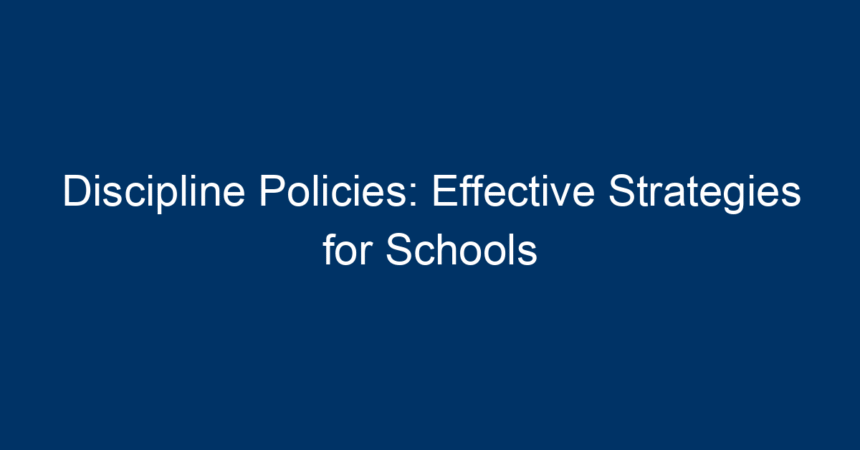In today’s dynamic educational landscape, the implementation of effective discipline policies in schools is more essential than ever. Students thrive in environments where expectations are clear, consequences are understood, and support is available for growth. By fostering a culture of respect and accountability, schools can not only enhance student behavior but also improve academic performance. This article delves deep into the strategies that can make discipline policies effective and beneficial for all stakeholders in the education system.
Understanding Discipline Policies
Discipline policies are a framework set by schools to manage student behavior and maintain a conducive learning environment. These policies outline expectations, rules, and the consequences of violating these standards. The cornerstone of effective discipline policies is their clarity; students should know what is expected of them and the repercussions of their actions.
The Importance of Clear Discipline Policies
Clear discipline policies serve multiple purposes:
-
Setting Expectations: When students know the rules, they are more likely to adhere to them. Clarity creates a predictable environment.
-
Building Trust: Consistent policies foster trust between students and educators, allowing for healthier relationships.
-
Promoting Fairness: Clearly-defined rules help ensure that all students are treated equally, enhancing the sense of justice within the school community.
- Supporting Learning: Effective discipline policies are not just punitive; they also promote a culture of learning and personal growth.
Effective Strategies for Schools
1. Involve Stakeholders in Policy Formation
One of the most powerful strategies for developing impactful discipline policies is involving stakeholders—including students, parents, and teachers. When diverse voices contribute, policies are more likely to be accepted and respected.
-
Surveys and Feedback: Conduct surveys and forums to gather insights and suggestions from students and parents, ensuring their perspectives inform the policies.
- Focus Groups: Utilize focus groups to discuss potential policies, allowing for rich discussion and a range of ideas.
2. Promote Positive Behavior
Rather than merely punishing negative behavior, schools can focus on promoting positive behavior through incentive programs.
-
Reward Systems: Implement a reward system where students earn points or privileges for demonstrating good behavior, which can help shape a positive school culture.
- Recognition Programs: Celebrate students who exemplify the values of the school. This could be through awards, assemblies, or shout-outs.
3. Provide Training to Staff
Faculty and staff are critical to the success of discipline policies. Training educators on behavioral management techniques, conflict resolution, and understanding student needs can make a significant difference.
-
Workshops: Regular workshops can equip staff with the necessary skills to handle disciplinary issues effectively.
- Mentorship Programs: Pairing experienced staff with new educators can help reinforce best practices in managing student behavior.
4. Implement Restorative Practices
Restorative discipline focuses on repairing harm rather than solely punishing the offender. This approach encourages accountability and reconciliation, ultimately leading to a more harmonious school environment.
-
Circles: Facilitate discussion circles where students can express their feelings and discuss conflicts, allowing for understanding and resolution.
- Restorative Conferences: Bring together affected parties to discuss the harm done and agree on steps to repair the relationship.
5. Utilize Data for Continuous Improvement
Effective discipline policies should be dynamic, adapting over time based on data collected from various sources.
-
Behavior Tracking: Implement a system for tracking behavioral incidents to identify patterns and areas for improvement.
- Review Policies Regularly: Schedule regular evaluations of discipline policies to ensure they remain relevant and effective.
6. Foster a Supportive Environment
Creating a supportive school environment can significantly reduce behavioral issues. When students feel safe and valued, they are less likely to act out.
-
Counseling Services: Provide access to counseling services to support students’ emotional well-being, addressing underlying issues that may contribute to misbehavior.
- Social-Emotional Learning: Incorporate social-emotional learning (SEL) into the curriculum, teaching students crucial skills such as empathy, self-regulation, and conflict resolution.
The Role of Communication in Discipline Policies
Effective communication is vital for the success of discipline policies. Transparency fosters trust and ensures that everyone is on the same page.
Communicating Policies to Students and Parents
-
Orientation Sessions: At the beginning of the school year, hold orientation sessions for students and parents to explain the policies and answer any questions.
- Handbooks and Materials: Distribute clear, easy-to-read handbooks outlining the policies, procedures, and repercussions, ensuring they are accessible to all families.
Strategies for Ongoing Communication
-
Regular Updates: Keep the school community informed of any changes to the policies through newsletters, emails, or community meetings.
- Feedback Mechanisms: Establish ways for students and parents to provide ongoing feedback about the policies and their effectiveness.
Conclusion: Taking Action
Implementing effective discipline policies requires thoughtful strategies that engage all stakeholders and prioritize a positive school environment. By involving stakeholders, promoting positive behavior, training staff, utilizing restorative practices, employing data, and communicating clearly, schools can create a supportive atmosphere where students thrive.
Actionable Insights:
-
Engage the Community: Start a conversation with students, parents, and teachers about current policies and gather feedback for improvement.
-
Train Staff Regularly: Schedule professional development sessions focused on classroom management and restorative practices.
-
Monitor and Adapt: Set up a system to track behavior incidents and review policies annually for updates and relevancy.
- Celebrate Successes: Develop recognition programs to celebrate positive behavior, fostering an environment of encouragement.
Effective discipline policies are a critical component in creating a positive school culture, ultimately leading to improved student behavior and learning outcomes. With a focus on collaboration, communication, and continuous improvement, schools can pave the way for a brighter educational future.




